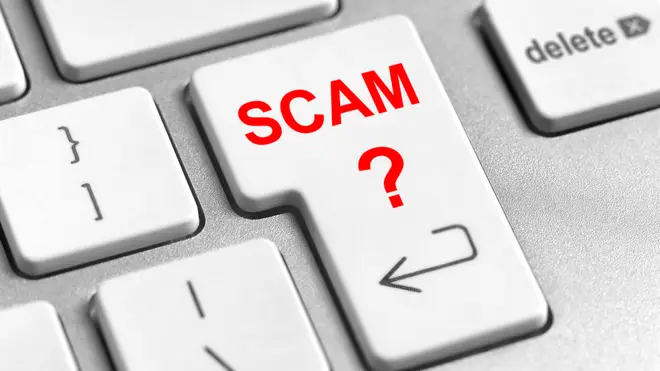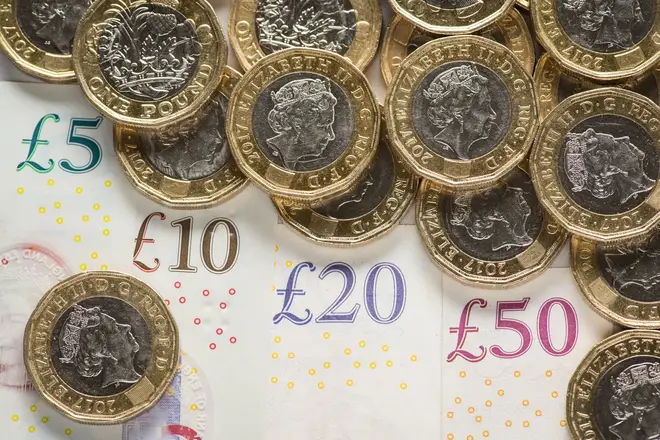
James O'Brien 10am - 1pm
25 March 2020, 11:15
Fraudsters are using the Covid-19 lockdown and pandemic to scam people out of their money and personal data.
The National Crime Agency (NCA) has warned people to remain vigilant of fraudsters and scammers during the Covid-19 outbreak.
Criminals are trying to "rush and panic" people into buying items online and offering them deals that are "too good to be true".
Yoav Keren, CEO of Brandshield, a company that provides cyber solutions, told LBC News that hackers are exploiting people while they spend more time online during the pandemic.
He said: "They are doing all kind of fraudulent activities online, such as phishing sites, fraud sites or counterfeit sales sites."
So how can you stay safe when online and how can you spot a scam?
For all the latest coronavirus updates in the UK and across the world, click here for our live blog

Director general of the National Economic Crime Centre Graeme Biggar said some scammers pose as legitimate sellers of high-demand goods, such as face masks and hand sanitisers, or even fake testing kits and supposed cures of Covid-19.
Some may exploit people's financial concerns by asking for upfront fees for bogus loans, while scams can come in the shape of emails, phone calls, text messages or social media posts.
Others have targeted people's pension pots or the elderly and even posed as banks, police officers or the Government.
Mr Biggar warned that fraudulent activity is likely to increase as people move toward working remotely or from home.
Phishing scams - where legitimate-looking emails ask for money or personal details - are also a danger, with more than 200 people being reported to have fallen victim to them during the pandemic.
Specific examples include receiving emails from someone posing as the US Centre for Disease Control or the World Health Organisation, claiming to provide a list of local infections. To access the list, people are made to click a credential-stealing link or make a payment to an e-currency Bitcoin account.
Criminals are using the #COVID19 pandemic to scam the public – don’t become a victim.
— National Crime Agency (NCA) (@NCA_UK) March 25, 2020
Criminals are experts at impersonating, they spend hours researching you for their scams, hoping you’ll let your guard down for just a moment.
Read more ➡ https://t.co/vMgRQyv8sE pic.twitter.com/fSNjVd2tAQ
City of London Police reported a 400 per cent rise in reports to Action Fraud - the National Fraud and Cyber Crime Reporting Centre - during the outbreak.
From the 105 reports that were made to the centre since 1 February, people have lost just shy of one million pounds (£970,000).

Firstly, you must take your time when researching goods you purchase online. Be careful when responding to emails, messages from Government agencies, or requests for money made over the internet.
The NCA said that "only criminals will try to rush or panic you" or offer you deals that seem "too good to be true".
It is absolutely fine to ignore or even refuse these types of requests that are made online, especially if they are unsolicited. You should also never provide personal data - such as your full name, address and date of birth - as criminals may use this to steal your identity.
If you can, use anti-virus software to protect yourself from online viruses and malware (where links or downloads can put malicious software into your computer without your knowledge).
You should also avoid clicking links in emails or messages unless you know where it has come from, with the NCA adding that neither banks nor the police will ask people to transfer money or move it into a safe account.
Just because someone knows a few basic details about you, it doesn’t mean they are genuine. Fraudsters regularly use personal information to build trust and believability. pic.twitter.com/PJ94fjwVfm
— Action Fraud (@actionfrauduk) March 25, 2020
You should immediately contact your bank if you believe you have fallen victim to a scam or fraud. You should also report it to Action Fraud or Police Scotland.
Other things you can do to prevent it from happening again are changing your password and running your anti-virus software, according to the National Cyber Security Centre.